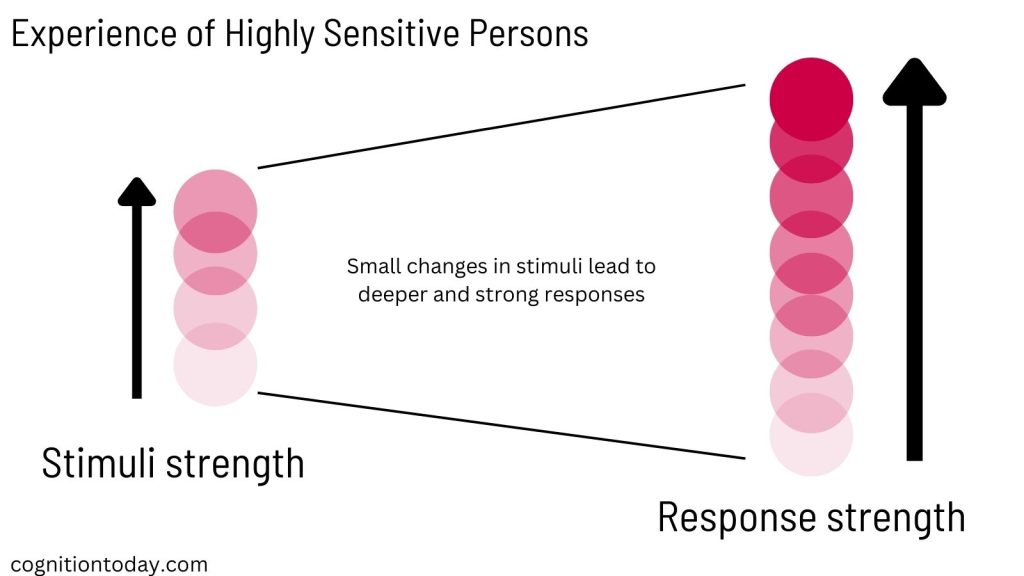Overwhelmed. Too loud. I need some silence. That movie was too much for my senses. I can’t stop crying about what Elsa went through. Too overstimulated. I can’t talk with anyone; I just want to switch off the lights and lie down.
Oh god, why am I so sensitive?
If these thoughts resonate with you, chances are you are a highly sensitive person. A highly sensitive person (HSP) is high on the “Sensory Processing Sensitivity” (SPS) personality trait, which has both good and bad outcomes for well-being.
- What is Sensory Processing Sensitivity and who are Highly Sensitive Persons?
- Signs of a High SPS person (HSP)
- The easy and difficult side of being HSP
- Broad tendencies of high SPS
- Orchids, Tulips, Dandelions – environmental sensitivity
- Why are some people highly sensitive?
- Traits that appear like being highly sensitive
- Traits that appear opposite to being highly sensitive
- 10 Coping tips for highly sensitive people
- Sources
What is Sensory Processing Sensitivity and who are Highly Sensitive Persons?
The Sensory Processing Sensitivity trait measures how biologically sensitive[1] one is to a wide range of stimuli and contexts. SPS is a trait that describes how all individuals differ in their sensory, cognitive, and behavioral responses to anything that catches their attention.
Highly sensitive persons, sometimes called neuro-sensitive people, are those who have high sensory processing sensitivity.
Those with high sensory processing sensitivity (aka highly sensitive people) have a general tendency[2] to cognitively and biologically process stimuli, emotions, and changes more strongly and deeply, which can leave them overstimulated. They are easily excited/depressed and have a low sensory threshold, so they experience visuals, textures, touch, noises, pain, and taste in a more exaggerated way than their low SPS counterparts. What’s normal to others might feel like sensory overload. They also easily notice and respond strongly to other people’s feelings and needs, making them more empathetic and aware.
It’s not just in humans; all animals have an SPS group. Dogs also vary[3] in their sensory processing sensitivity. Some dogs may be hyper-reactive and highly responsive to small changes in their food’s taste or smell and feel extra excited when they see you after work or extra sad when they don’t see you.
HSP tendencies are present at birth and at least partially inherited. They are also considered a personality trait and not a disorder, so there is no need to fix sensory processing sensitivity.
Highly sensitive persons are biologically and cognitively deep processors, so each stimulus brings out a relatively strong response. The intensity of any stimulation doesn’t have to be too high to arouse, please, or frustrate an HSP.
Example: For an HSP, 50% volume for music might be enough, but a sensation seeker might want 90% volume, and a non-HSP non-sensation-seeker might be ok with 70%. An HSP may get uncomfortable at 55% volume because they notice the subtle change, but a non-HSP person might be ok with a 5% difference because it hardly feels louder to them.
They exhibit heightened biological, emotional, and stress reactivity. This means they react strongly to small changes, whether they are negative or positive changes. High SPS people may easily feel joy or sadness, quickly get stressed with work pressure or quickly relax during a trip. Their high depth of processing and sensitivity to nuances usually leads to better memory and awareness. So a high SPS person may go to a concert, feel overwhelmed by the loudness, but also notice deep musical details and remember them for years.
Because of these personality features, HSPs have positive tendencies like learning deeply and showing creativity, but also a downside, such as easily feeling overwhelmed with socializing and feeling emotions too strongly.

Signs of a High SPS person (HSP)
- you process experiences and emotions very deeply
- you can easily pause before acting in a situation
- you spend time cognitively assessing a situation with questions and analysis
- you have high empathy and emotional arousal
- you are affected by emotions very strongly
- you are sensitive to stimulation
- you think deeply or overthink
- you get happy, angry, frustrated, or sad quickly
- you process a lot of information
- you take time to recover from overstimulation
- loud sounds, socializing, and pain is overwhelming
The easy and difficult side of being HSP
| HSP advantages | HSP risks |
|---|---|
| High empathy, awareness, and cooperation | Easily stressed, overwhelmed, overstimulated |
| High learning potential | Susceptible to social anxiety, depression, anxiety, autism[4] |
| Attentive to beauty and positive experiences | Prone to seasonal affective disorder[5] |
| Careful work | Prone to gastrointestinal problems[6] |
| Avoid harm/danger | Sensitive to odd and seemingly paranormal stimuli[7] |
| Form deep valuable relationships | Difficult to find a partner who gets your sensitivity |
| Easy to please | Easy to get uncomfortable, irritated |
Broad tendencies of high SPS
The highly sensitive person scale measures 5 distinct variables[8]. These are components of your overall sensory processing sensitivity.
- Negative Affect: They are prone to negative emotions.
- Neural Sensitivity: Their central nervous system responds to minute changes.
- Propensity to Overwhelm: Sensory stimulation and emotions get overwhelming.
- Careful Processing: They pay attention to details, process information deeply, and observe carefully.
- Aesthetic Sensitivity: They are moved by art and notice positive stimuli easily.
Orchids, Tulips, Dandelions – environmental sensitivity
Sensory processing sensitivity is a part of a general cognitive and behavioral concept of “environmental sensitivity”. If we equate people to flowers[9], people lie on a spectrum based on how the environment affects them. On one side, we have “orchid people” who are heavily affected by environmental changes. On the other side, we have “dandelion people” who are not as affected by environmental changes. And in the middle, we have “tulip people” who are sensitive to environmental changes but not too sensitive. This classification can apply to all life forms, and many, many animals show differences in their environmental sensitivity, which essentially affects their overall behavior.
Across all 3 points on the environmental sensitivity spectrum, there are advantages and disadvantages.
| Type | Pros | Cons |
|---|---|---|
| Orchid people (HSP or high SPS) | Learn well, creative, empathetic, highly trainable | Easily overwhelmed, react strongly, volatile, need help in crises |
| Tulip people (average SPS) | Fairly well adjusted | Might not have deep experiences |
| Dandelion people (low SPS) | Resilient, secure relationships | Might not respond adequately to a crisis, ignore threats |

Why are some people highly sensitive?
15-20%[10] of all people and up to 35% of children[11] are high SPS. High SPS is a trait that is advantageous because only a small portion of the population has it. In biology, this is called “negative-frequency dependent selection”. The trait survived through evolution only because its relatively low frequency in the population gave it an advantage. That means if everyone is high on sensory processing sensitivity, the trait has no advantage. But when only a few have it, the pros outweigh the cons.
For example, if everyone is HSP, there will be no competitive advantage in learning better or having more empathy. But if few are more creative and observe deeply due to their HSP, they carve their niche.
Highly sensitive people’s behavior and certain disorders like autism, schizophrenia, and PTSD share common features, but a review of research[12] suggests that being HSP is biologically different from having any of these disorders. Although overtly similar, these disorders create a disadvantage to survival, but HSP creates an advantage. The increased depth of processing, sensitivity to stimulation, higher empathy, and environmental awareness help improve memory for social and environmental information and increase the range of meaningful, useful responses/behaviors, which then contributes to better cooperation and survivability.
Traits that appear like being highly sensitive
- Neuroticism: Neuroticism is a general proneness to anxiety, worry, and negative thoughts. On one level, when an HSP is overwhelmed, it may look like neuroticism because being overwhelmed is stressful with negative emotions. As an HSP, you may feel your health complaints are exaggerated, but research suggests[13] that a personality trait called “neuroticism” affects complaints more than being highly sensitive in general. Neuroticism involves proneness to negative evaluations, and therefore, more health complaints.
- Autism: Many people (adults and children) on the spectrum are very sensitive to changes, just like an HSP. But there are other information processing differences between HSPs and autistic people, such as autistic people thinking literally and not understanding metaphors, while an HSP might process a metaphor very deeply.
- Introversion: Because highly sensitive people are easily overwhelmed, they need downtime to reboot. This is expected behavior for an introvert. However, the motivation is different. An introvert prefers low social energy, but an HSP would require low social energy to reduce social burnout.
Traits that appear opposite to being highly sensitive
- Sensation seeking: Sensation seeking is a tendency to prefer risk, novelty, variety, and heavy stimulation. One incomplete theory is that sensation-seekers have low sensitivity, so they crave more stimulation. However, some people simultaneously exhibit sensation-seeking tendencies and high sensory processing sensitivity. How these 2 are compatible is unclear.
- Extroversion: Extroverts are not easily overwhelmed by people and actively do stimulating things. In that sense, it’s the opposite of being an HSP who gets overwhelmed and requires solitude to reboot and normalize. However, many HSPs can be extroverted and thoroughly enjoy their time going out and meeting new people.
As a highly sensitive person, …..you may become more anxious or fixate on negative things. …..but also develop strong positive moments, empathy, and creativity.
As a highly sensitive person, …..you may become more anxious or fixate on negative things. …..but also develop strong positive moments, empathy, and creativity. Share on X10 Coping tips for highly sensitive people
If sensory stimulation, social stimulation, or emotional stimulation has overwhelmed you, you may need to reboot. Here are some SPS-friendly ways. The goal of these coping mechanisms is to prevent your high SPS from turning into mental health issues and burnout, so you can enjoy yourself without feeling too overwhelmed too often.

- Few positive relationships and good alone time: Since HSPs tend to form deep connections, a few good friends/family and significant alone time can help you recover. Take your time to ease into relationships and prioritize the right balance between social, personal, and alone time.
- Connection with nature: Nature and lifeforms improve well-being and offer a good sensory break. Although nature offers strong sensations, the sensations are in an evolutionary comfort zone. They will restore your attention and re-energize you.
- Introspection and self-reflection: As a person just learning about their high SPS, it will be valuable to know what stimulation is overwhelming you the most. You can then adjust your lifestyle to manage it. Social compulsions, endless notifications, loud environments, visual distractions in a room, etc., are common sources of overwhelm.
- Deliberate self-love (high SPS can make you self-critical): You may need an extra dose of self-love to recover from the impact of negative emotions and associated overthinking. Because HSP makes it easy to amplify everyday social and interpersonal details, you are more prone to negative social comparison, feeling responsible for others, feeling the empathetic need to solve others’ problems, etc. And if you don’t, you may feel guilty or helpless. To counter these feelings/spiral, show self-love and accept your feelings for what they are – just feelings and not responsibilities. Show self-love to accept rest and alone time as a valid way to take care of your needs.
- Environmental adjustments: Room lighting, caffeine intake, background noise, etc., can be overwhelming, but these are manageable problems. Your safe space can be a low-stimulation place, and you can use earphones, specific curtains, dim lights, pastel decor, etc., to make yourself more comfortable.
- Recovery: Negative emotions generally hit harder than positive emotions, and more so for HSPs. To compensate for this, HSPs can benefit from being aware of things that give them hope. You will need a strong source of positive emotions – be it a favorite artist, a safe person, a pet, a room, or a comfort TV show.
- Sleep: Focus on a healthy sleep routine, with naps that restore you before a potentially overwhelming event. Good sleep reduces emotional reactivity, and sleep deprivation increases it. Being HSP, quality sleep is important. Otherwise, it may aggravate SPS.
- Artistic expression & hands-on creativity: Because HSPs process details deeply, they have an added advantage to creating art and going hands-on. This usually removes the social overwhelm and makes other intense stimulation a part of their “liked stimulation”. Doing art can be deeply satisfying, and this can quickly help in emotional recovery.
- Deep learning: A lot of specialized knowledge and skill requires thorough and deep understanding. This may come easy to you compared to others and give you a competitive advantage. So excelling at something might be an easier reward for you than others, which can contribute to overall well-being.
- Finding partners: Being an HSP can be difficult for a relationship because you may need regular downtime and low-key hangouts, which dating might make difficult. Since high SPS isn’t a disorder or a problem to fix, it’s best to find a partner who understands you are sensitive to stimulation and may need quiet time, which doesn’t suit a high-paced relationship.
Sources
[2]: https://journals.sagepub.com/doi/full/10.1177/2165222816660077
[3]: https://pubmed.ncbi.nlm.nih.gov/28520773/
[4]: https://www.sciencedirect.com/science/article/abs/pii/S0191886908001281
[5]: https://pubmed.ncbi.nlm.nih.gov/30599439/
[6]: https://pubmed.ncbi.nlm.nih.gov/36011526/
[7]: https://pubmed.ncbi.nlm.nih.gov/36103566/
[8]: https://link.springer.com/article/10.1007/s12144-020-00988-7
[9]: https://link.springer.com/article/10.1007/s12144-020-00988-7
[10]: https://journals.sagepub.com/doi/abs/10.1177/1088868311434213
[11]: https://psycnet.apa.org/record/2017-42386-001
[12]: https://pubmed.ncbi.nlm.nih.gov/29483346/
[13]: https://journals.sagepub.com/doi/full/10.1177/2165222816660077

Hey! Thank you for reading; hope you enjoyed the article. I run Cognition Today to capture some of the most fascinating mechanisms that guide our lives. My content here is referenced and featured in NY Times, Forbes, CNET, and Entrepreneur, and many other books & research papers.
I’m am a psychology SME consultant in EdTech with a focus on AI cognition and Behavioral Engineering. I’m affiliated to myelin, an EdTech company in India as well.
I’ve studied at NIMHANS Bangalore (positive psychology), Savitribai Phule Pune University (clinical psychology), Fergusson College (BA psych), and affiliated with IIM Ahmedabad (marketing psychology). I’m currently studying Korean at Seoul National University.
I’m based in Pune, India but living in Seoul, S. Korea. Love Sci-fi, horror media; Love rock, metal, synthwave, and K-pop music; can’t whistle; can play 2 guitars at a time.



























